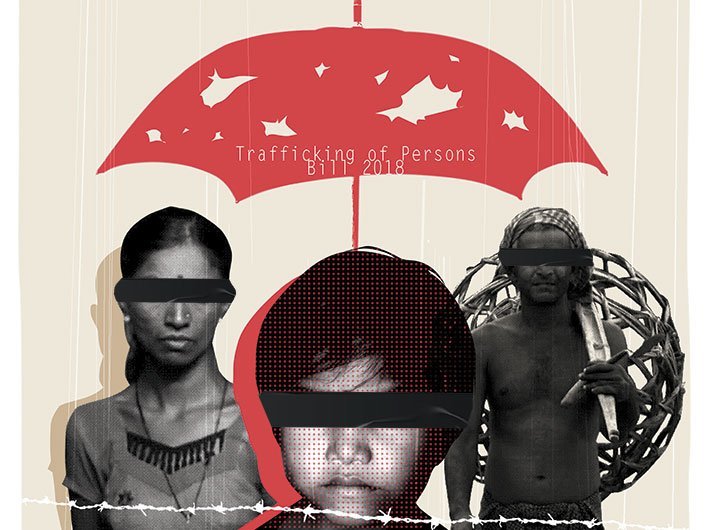While the entire nation is agog with political grapevine, political parties are weighing on all options to lure voters by touching upon issues that impact their lives. Several parties, including the BJP and the Congress have released their manifestos while many are about to join the bandwagon. The common agenda for the parties is to win hearts, minds and their votes.
So many important issues such as unemployment, minimum income, farm distress, safety and protection of women and children, national security, fiscal stability, legislative and judicial reforms etc. have come out as key electoral issues ahead of the Lok Sabha polls. But one thing that failed to attract our political fraternity is the issue of human trafficking – a thriving criminal enterprise which is expanding at an alarming rate across the country.
Trafficking for the purposes of sexual exploitation is the most common form of human trafficking, and it is one of the fastest growing organized crimes in the world today. According to United Nations Office on Drugs and Crime, almost a third of trafficking victims are children, and 20 percent of all trafficking victims are girls. If the Global Slavery Index, brought out by Walk Free Foundation last year, is to be believed, the situation in India is quite alarming too. It estimated that on any given day there were nearly 8 million people living in modern slavery in India in 2016. In terms of prevalence of modern slavery in India, there were 6.1 victims for every thousand people, it said.
But the situation still doesn’t evoke our political leaders enough to recognise it as a people’s issue and commit to address it if they come to power. This is what appears, as the issue has not found any place in the manifestos released recently by national political parties.
The “Sankalp Patra” or manifesto for 2019 general elections that the BJP released on Monday with focus on issues of national security and development does not mention anything about human trafficking, which the BJP-led NDA Government wanted to address by bringing in the Trafficking of Persons (Prevention, Protection and Rehabilitation) Bill 2010. It is surprising that the manifesto does not have even any reference to the Bill, which was passed in Lok Sabha in July 2018 but could not be tabled in Rajya Sabha in the last two Parliament sessions.
The manifesto speaks about time-bound investigation in cases of crime against women; promoting gender justice and creating awareness about issues related to women; ensuring comprehensive social security coverage for all unorganised labourers, but conspicuously remains silent on the issues of trafficking, bondage or servitude.
The term “trafficking” doesn’t even feature in the manifesto that Congress has released few days ago. Under section “Women’s Empowerment and Gender Justice”, the manifesto however says that “Congress will pass a model legislation to establish a separate investigative agency to investigate heinous crimes against women and children and urge State Governments to enact a law to establish such an investigative agency”. But not a single word on trafficking.
It seems the thousands of trafficking survivors and the millions of innocent women and men who are highly susceptible to become victims of this growing menace are not yet a major stakeholder for our political parties. Perhaps their votes don’t count. Even if they do vote, their franchise is not yet considered decisive for parties to recognise their issue – the unspeakable miseries and trauma they go through as victims of trafficking of various forms: commercial sexual exploitation, bondage, forced marriage and surrogacy or trafficking for organ trade among others.
It would not be correct to say that political parties lack knowledge about human trafficking and hence, the issue has become a low political priority. Perhaps they see the issue under the lens of violence against women and children, and forced labour. There have been several such incidents occurred in the past five years, and political parties seem to have not got a grip over what is happening socially beyond treating them as disparate crimes that has to be addressed only through stricter laws.
Similarly, while political parties have spoken about farmers - small and marginal as well, no one has spoken about landless farmers, migration and bonded labour that has established links to human trafficking.
The 2019 manifesto of All India Trinamool Congress says,” We are committed to enhance the livelihood of landless labourers,” but doesn’t speak anything on landless farmers, the issue of migration and bonded labour.
So far the CPI and two southern regional parties – DMK and AIADMK – have touched upon the issue of human trafficking in their 2019 manifestos by mentioning the need of a stringent legislation to eradicate human trafficking, including sex trafficking, bonded labour and trafficking of humans for smuggling organs.
What other parties have said or are going to say with regard to this issue need analysis and verification, but so far it appears that like in past elections, votes of trafficking survivors don’t count.
